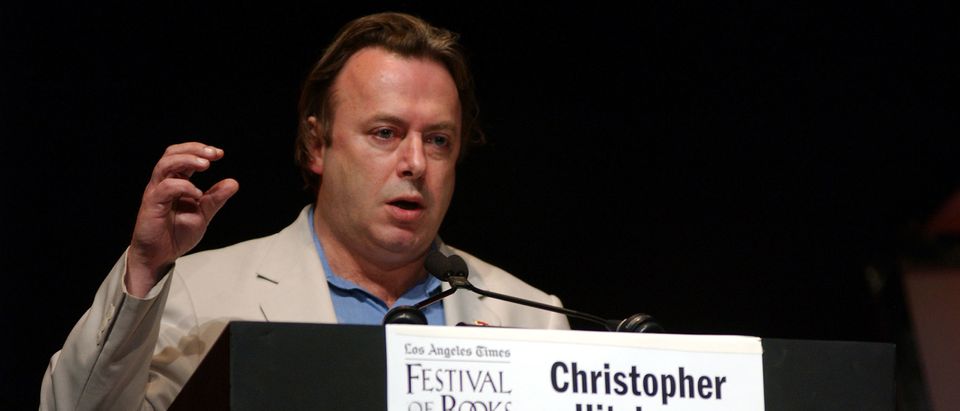The irreverent, iconoclastic, British-born, Oxford-educated journalist Christopher Hitchens died on December 15, 2011. If there is one journalist whose writings and voice I have missed since, it’s Hitchens’.
We both attended the same Oxford college, Balliol, a few years apart. I first met Hitch in Washington, D.C., at a farewell party for a mutual friend, Sherard Cooper-Coles, then a high-ranking British Embassy diplomat.
I can recall talking with Hitch in a corner at the party about our mutual admiration for novelist Ian McEwan. I’d merely read everything McEwan had written; Hitchens was one of McEwan’s closest friends, along with novelist Martin Amis and poet James Fenton. After that encounter, I made it my business to try to read everything Hitchens wrote.
I ran into him early one morning at New York’s LaGuardia Airport as we both awaited the first shuttle to D.C. Hitch looked like he always did: tie askew, shirt collar unbuttoned, chest bared, rumpled like he’d been up all night. (He had.) That’s when I first learned, surprisingly, that he endorsed George W. Bush’s Iraq invasion.
As a Republican, I’d set aside my misgivings and subscribed to The Nation just to read Hitchens. His endorsement of Bush was too much for the far-left weekly. They let him go. I didn’t renew my subscription.
Hitchens had a penchant for telling things as he saw and experienced them: in columns, in books, and on television. His views were always carefully honed, enhanced by his remarkably wide, encyclopedic reading in seemingly every subject, especially English literature. He once even endured water-boarding to ensure accurate war reporting.
George Orwell was a special Hitchens favorite, as was Martin Amis’s father, Kingsley, who, like Hitch, had a special fondness for well-crafted English sentences and well-crafted alcohol.
Hitchens skewered cultural and political icons with abandon. He was bipartisan in his scorn and withering in his analysis. He subtitled his book on Mother Teresa “The Missionary Position,” and he was well ahead of his time in identifying the Clintons as grifters, titling his book on Bill Clinton, “No One Left to Lie To.” The paperback edition listed three women he contends Clinton raped.
And then there was former Secretary of State Henry Kissinger. Hitchens famously branded him a war criminal. A short study of Thomas Jefferson, however, elicited enthusiastic praise for the American founder.
Everybody knew how much Hitch enjoyed scotch, usually starting at midday. His favorite was the pricey Johnny Walker Blue, which he fondly called “Mr. Walker’s amber restorative.” Charles Dickens could not have written better.
At a luncheon in New York City where I’d persuaded him to speak, I noticed while sitting next to him that he wasn’t touching his food. “Oh no, Charles. Can never lecture on a full stomach.” But he did down two “Blue” restoratives on an empty stomach before giving a brilliant, hilarious overview of American domestic policy.
Hitchens took on religion and God in his well-researched and skeptical book, “god is Not Great.” The devout were not amused, but his book was a lively send up, reminiscent of that famous line in Philip Larkin’s poem “Aubade” deeming religion a “vast moth-eaten musical brocade/Created to pretend we never die.” My only complaint about the book, delivered to Hitch via e-mail, was that he’d let the Mormons off too lightly.
No Pascal wager from Hitchens, though. And, like former Archbishop of Canterbury Thomas Cranmer, set on fire at Mary I’s stake (in front of Balliol, coincidentally), no backsliding when facing certain death.
The week his autobiography, “Hitch-22,” became a best-seller, Hitchens was diagnosed with stage-four esophageal cancer, the same disease that killed his father. Writing in Vanity Fair, he solemnly informed us: there is no stage five.
While his enemies gleefully waited for Hitchens to “get religion” near the end of his life, Hitchens continued with articles describing his medical treatments while also skewering Pope Benedict XVI, whom he repeatedly referred to as Joseph Ratzinger.
Near the end, again in Vanity Fair, he listed two regrets: that he’d probably not live long enough to attend his daughter’s high-school graduation and to write Joseph Ratzinger’s obituary.
During his life, Hitch’s personal identities evolved. He became an American citizen and discovered with considerable pride, years after her death, that his mother had been Jewish.
Not since H.L. Mencken has American journalism had such a voice. Today, consider raising a glass of amber restorative in his memory.
Charles Kolb served as Deputy Assistant to the President for Domestic Policy from 1990-1992 in the George H.W. Bush White House


